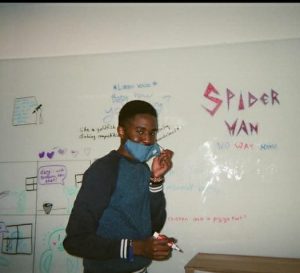Some people come into university knowing exactly what they’re going to do with their lives. Most importantly, they know how to maintain a trajectory that coincides with their postgraduate career plans. Their specific and clear goals turn the choice of a major into a simple science. I both envy such people for the clarity they’re afforded by being so sure, and respect them for riskily committing to a specific path despite inevitable hardships.
I relate more with everyone who has come into university with a murkier vision of their final destination. Most of us are looking to better educate ourselves and find out what our future lives as professionals could look like. While this can be an exciting experience to go through, navigating the difficulties of university is only made harder when faced with the doubts and insecurities of the unknown.

This uncertainty is especially difficult in context of all the different sources of pressure that we face. With the knowledge that there are people making sacrifices on your behalf, there comes an inescapable obsession to be successful and make their efforts pay off. There’s also internal pressure. Before anyone else, we all must prove to ourselves that we have what it takes to make something of our lives. And finally, there is the general societal pressure that comes from the competitive nature of living. Be it gunning for coveted positions or even trying to secure a lease, life often feels like one huge rat race where comparison is the name of the game and being better than the next person is everyone’s aim.
There’s a popular tendency to say that dilemmas like this are okay because everyone goes through them. In my eyes, this perspective is useful but still falls short. While there’s solace in knowing that your struggle is shared, at the end of the day it is up to you to figure it out. With this said, I personally have some strategies that I think can help me and many others to at least start the process of “figuring it out”.

(Keep in mind that I am not a professional career advisor, and these thoughts are simply personal judgments of the situation).
- The first strategy is to rely on your own intuition. Thinking about it on a very simplistic but realistic level, there are four questions someone could ask themselves when thinking about what future they’d like to pursue. I believe that somewhere amongst the responses are some clues as to where you could potentially see yourself performing within society (or outside of it if you’d like).
- What do you like doing?... As some lucky professionals could attest to, pursuing something you’re passionate about can be fulfilling.
- What are you good at?… Playing to your strengths is always a great idea. Even though you may not be interested in the obvious careers associated with one of your skills, perhaps there are ways you can apply the perspective/knowledge you have in other ways.
- Are there things that you’re both good at and enjoy doing?… Jackpot. Having something that you’re good at and enjoy gives you the motivation to put in the work and develop your skills. There are a million things that could derail you from committing to something of this nature. Keep your doubts at bay by remembering that trying is literally the best you can do!
- What are you interested in learning?… If you’re not convicted about any one area of focus, think about other ways to be inspired. Is there anything you don’t know much about but would be interested in learning?
- The second strategy is to rely on professional advice:
- Academic & Career Advising: This resource is helpful for planning your coursework in university to coincide with your potential future goals. For more info or to connect with an advisor, visit this page.
- Career Advising: The Career Advisors are a better resource for navigating career decisions, discussing what options you could consider, and providing advice on job markets, interview processes, resumes, and more. For more info or to chat with an advisor, visit the Career Advising webpage.
- The third strategy is to gain work experience
- Work experience: Whether its general work, co-op, or volunteer positions, taking on a job or two before you’ve figured everything out can help you discover your strengths and weaknesses and could give you a better idea of what sort of work you’d like to pursue in the future. If you’re looking for on campus positions check out the UBCO Job Board.
- The fourth strategy is to establish a support system:
- Family: While everyone’s family situation is different, they might be the people you can rely on most. They know you well and can help you handle the pressure better and remain grounded.
- Friends: You’re going through this together. Do your best to encourage each other and celebrate each other’s victories.
- Counselling: If it ever feels too much, or if you just want to preemptively seek help before things get overwhelming, counselling is a great resource. Learn more about or book an appointment with UBC Counselling.
All of us have the potential to become the best versions of ourselves. You may not know how you’re going to get there, but I have a good feeling that you’re going to. It won’t be easy but try to have some faith and trust that it will all work out in the end.
Remember, you can only do what’s in your control. And so, to conclude in perfect corny fashion I will quote I-Carly in saying: “Give your best and leave the rest to me” (except imagine me is whatever higher power you believe in, the universe, fate or whatever you’d like).
ABOUT THE AUTHOR
Alvin Nganga is an International Student from Nairobi, Kenya. He’s an international relations major and a lover of basketball and all things creative. As a summer content creator, he’s looking to entertain and connect with the UBCO community. In the process he hopes to meet new people and have a lasting impact in whatever way he can.